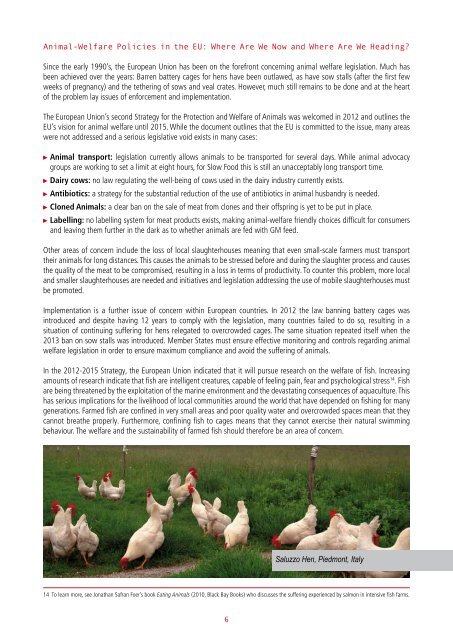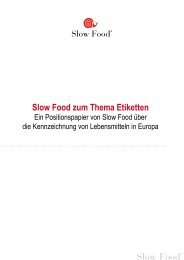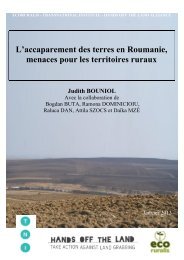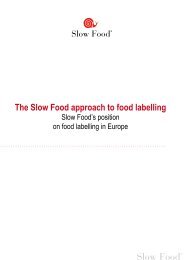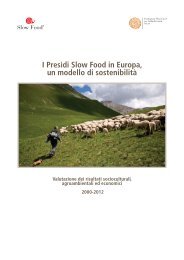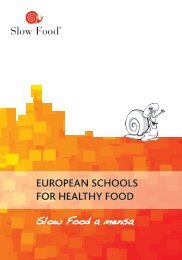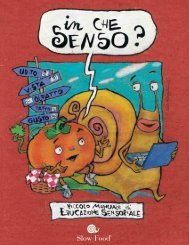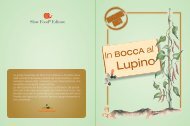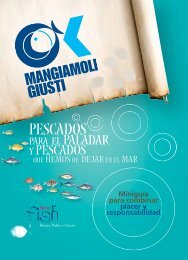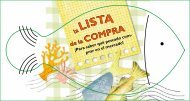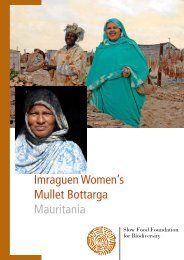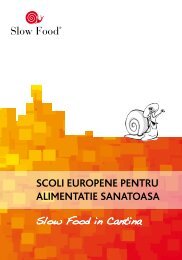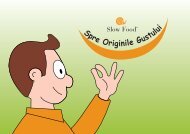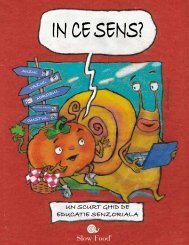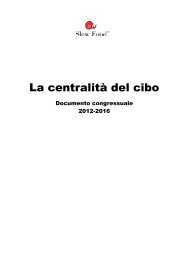Slow Food Policy Paper on Animal Welfare
Slow Food Policy Paper on Animal Welfare
Slow Food Policy Paper on Animal Welfare
You also want an ePaper? Increase the reach of your titles
YUMPU automatically turns print PDFs into web optimized ePapers that Google loves.
<strong>Animal</strong>-<strong>Welfare</strong> Policies in the EU: Where Are We Now and Where Are We Heading?<br />
Since the early 1990’s, the European Uni<strong>on</strong> has been <strong>on</strong> the forefr<strong>on</strong>t c<strong>on</strong>cerning animal welfare legislati<strong>on</strong>. Much has<br />
been achieved over the years: Barren battery cages for hens have been outlawed, as have sow stalls (after the first few<br />
weeks of pregnancy) and the tethering of sows and veal crates. However, much still remains to be d<strong>on</strong>e and at the heart<br />
of the problem lay issues of enforcement and implementati<strong>on</strong>.<br />
The European Uni<strong>on</strong>’s sec<strong>on</strong>d Strategy for the Protecti<strong>on</strong> and <strong>Welfare</strong> of <strong>Animal</strong>s was welcomed in 2012 and outlines the<br />
EU’s visi<strong>on</strong> for animal welfare until 2015. While the document outlines that the EU is committed to the issue, many areas<br />
were not addressed and a serious legislative void exists in many cases:<br />
► <strong>Animal</strong> transport: legislati<strong>on</strong> currently allows animals to be transported for several days. While animal advocacy<br />
groups are working to set a limit at eight hours, for <str<strong>on</strong>g>Slow</str<strong>on</strong>g> <str<strong>on</strong>g>Food</str<strong>on</strong>g> this is still an unacceptably l<strong>on</strong>g transport time.<br />
► Dairy cows: no law regulating the well-being of cows used in the dairy industry currently exists.<br />
► Antibiotics: a strategy for the substantial reducti<strong>on</strong> of the use of antibiotics in animal husbandry is needed.<br />
► Cl<strong>on</strong>ed <strong>Animal</strong>s: a clear ban <strong>on</strong> the sale of meat from cl<strong>on</strong>es and their offspring is yet to be put in place.<br />
► Labelling: no labelling system for meat products exists, making animal-welfare friendly choices difficult for c<strong>on</strong>sumers<br />
and leaving them further in the dark as to whether animals are fed with GM feed.<br />
Other areas of c<strong>on</strong>cern include the loss of local slaughterhouses meaning that even small-scale farmers must transport<br />
their animals for l<strong>on</strong>g distances. This causes the animals to be stressed before and during the slaughter process and causes<br />
the quality of the meat to be compromised, resulting in a loss in terms of productivity. To counter this problem, more local<br />
and smaller slaughterhouses are needed and initiatives and legislati<strong>on</strong> addressing the use of mobile slaughterhouses must<br />
be promoted.<br />
Implementati<strong>on</strong> is a further issue of c<strong>on</strong>cern within European countries. In 2012 the law banning battery cages was<br />
introduced and despite having 12 years to comply with the legislati<strong>on</strong>, many countries failed to do so, resulting in a<br />
situati<strong>on</strong> of c<strong>on</strong>tinuing suffering for hens relegated to overcrowded cages. The same situati<strong>on</strong> repeated itself when the<br />
2013 ban <strong>on</strong> sow stalls was introduced. Member States must ensure effective m<strong>on</strong>itoring and c<strong>on</strong>trols regarding animal<br />
welfare legislati<strong>on</strong> in order to ensure maximum compliance and avoid the suffering of animals.<br />
In the 2012-2015 Strategy, the European Uni<strong>on</strong> indicated that it will pursue research <strong>on</strong> the welfare of fish. Increasing<br />
amounts of research indicate that fish are intelligent creatures, capable of feeling pain, fear and psychological stress 14 . Fish<br />
are being threatened by the exploitati<strong>on</strong> of the marine envir<strong>on</strong>ment and the devastating c<strong>on</strong>sequences of aquaculture. This<br />
has serious implicati<strong>on</strong>s for the livelihood of local communities around the world that have depended <strong>on</strong> fishing for many<br />
generati<strong>on</strong>s. Farmed fish are c<strong>on</strong>fined in very small areas and poor quality water and overcrowded spaces mean that they<br />
cannot breathe properly. Furthermore, c<strong>on</strong>fining fish to cages means that they cannot exercise their natural swimming<br />
behaviour. The welfare and the sustainability of farmed fish should therefore be an area of c<strong>on</strong>cern.<br />
© Giuseppe Fassino<br />
Saluzzo Hen, Piedm<strong>on</strong>t, Italy<br />
14 To learn more, see J<strong>on</strong>athan Safran Foer’s book Eating <strong>Animal</strong>s (2010, Black Bay Books) who discusses the suffering experienced by salm<strong>on</strong> in intensive fish farms.<br />
6


